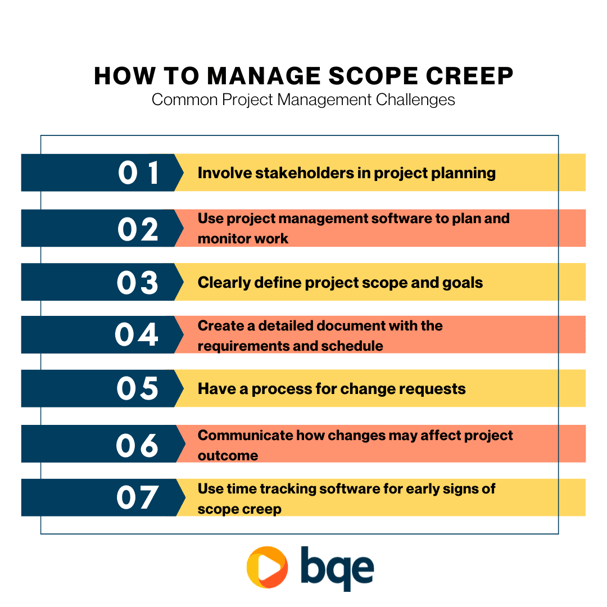Every project faces challenges, like meeting deadlines, staying on budget, organizing the team, or finding proper workflows. A stunning 71% of projects fail because they either go over schedule, exceed budget, or deliver unsatisfactory results. The larger and more complicated your project is, the more likely it is to fail.
Even if a project appears straightforward initially, there are always potential issues that you must prepare for, including last-minute changes and things beyond your control. Luckily, there are many ways to prepare for these problems.
Common Project Management Challenges
In this article, we dive into the most common project management challenges related to communication, scope, budget, and more, with tips to overcome them and execute successful projects consistently.
Scope Creep
Scope creep happens when a project’s requirements exceed what you originally planned. For example, once a project is underway, you push back the deadline by a month or agree to give the client more deliverables than initially scoped. These changes might seem harmless, but they can cause you to lose thousands of dollars and miss out on new projects and clients.
Exceeding scope is an issue because it affects your project’s schedule, costs, and resource allocation, and can ultimately hurt its profitability and goals. Scope creep can also negatively impact team morale by frustrating employees and holding them back from the sense of accomplishment we all get from finishing a job.
Scope creep is caused by several factors, including:
-
Poorly defined project requirements
-
Failing to document, share, and get feedback on requirements
-
Incorrectly sequencing tasks
-
Too few or too many stakeholders
-
Unclear or unrealistic goals
-
No process to manage change requests
How to Manage Scope Creep

Scope creep is very common and it’s unrealistic to prevent it altogether, but there are effective ways to minimize it. Some of project managers’ go-to processes to avoid scope creep are to:
-
Involve stakeholders in project planning
-
Use project management software to plan and monitor work
-
Clearly define project scope and goals
-
Create a detailed document with the requirements and schedule
-
Have a process for change requests
-
Communicate how changes may affect the project outcome
-
Use time tracking software for early signs of scope creep
These process changes are all worth implementing because preventing scope creep allows you to produce better results for clients, keep employees engaged, and protect your bottom line.
Client Onboarding
One of the most common reasons projects go off track is when expectations, responsibilities, and deliverables aren’t clearly defined from the beginning, it leads to confusion, scope creep, and missed deadlines. For architecture and engineering firms, where every project has multiple stakeholders, shifting timelines, and complex approvals, a lack of structure during the onboarding phase can create friction that compounds over the life of the project.
That’s why a clear and consistent client onboarding process is so critical. It sets the tone for the relationship, aligns both parties on goals and expectations, and ensures your team has all the information needed to execute efficiently. A well-designed onboarding checklist can streamline this process, reduce costly misunderstandings, and build client trust from day one. If your firm is still improvising each new engagement, it’s time to bring structure to the start of every project. Download our free Client Onboarding Checklist to help standardize your approach.

Communication Problems
Communication problems can do more than frustrate collaborators. They can completely derail a project. 40% of project failures can be directly attributed to poor communication.
Most projects involve a diverse group of cross-team and external team members or stakeholders, including clients, vendors, contractors, freelancers, and employees. Groups can quickly lose track of where a project is if the project manager isn’t sending regular updates, organizing meetings, communicating action items, or requesting feedback.
If project leaders don’t fix communication problems, your company may encounter:
Creating Stronger Communication
Strong communication keeps everyone efficiently moving toward a shared goal. It’s up to the project manager to set up smooth communication processes that offer transparency, improve accountability, and empower team members to communicate well.
Here are some simple actions that strengthen communication on a project:
-
Create a status report schedule
-
Set recurring meetings
-
Determine proper communication flows for collaborators
-
Proactively share changes or risks
-
Encourage a communicative team dynamic
-
Use a collaborative platform for projects, calendars, and documents
Poor Budgeting
Project budgeting can be tricky. You feel the pressure to do more with less, maximize profits, and plan for unforeseen costs — all without sacrificing the quality of your project’s outcome, causing delays, wasting resources, or hurting morale.
Straying from a project’s planned budget can lead to cost overruns, client issues, reputation damage, and affect your longer-term financial health. This isn’t an uncommon problem, as 57% of companies exceed their allocated budget, but improving your cost management can be the difference between your company’s success or failure.
How to Avoid Budgeting Issues
The best way to avoid budgetary issues is to use a project management solution like BQE CORE with built-in budget management. This makes it simple to create and track project-specific budgets by task, phase, employee, and resource, so you plan projects in greater detail and monitor progress in real-time. BQE CORE has prebuilt project-level reports, including the relationship between how much you spend and how much you earn.
In addition to adopting project management software, these steps help prevent budget trouble:
-
Plan your budget before the project begins
-
Review budgets of previous, similar projects and adjust based on learnings
-
Develop financial KPIs (key performance indicators)
-
Monitor expenditures
-
Budget for some surprises
-
Avoid straying from the agreed-upon budget
-
Keep relevant parties informed of the budget
Unrealistic Deadlines
Setting unrealistic deadlines often comes from the best intentions. You want to win new business, motivate your team, and achieve a new level of performance. But impractical deadlines have serious consequences, including reduced quality, broken promises, and stressed employees. It’s not worth it. Instead, focus on setting ambitious-yet-realistic deadlines that allow you to deliver your highest quality of service.
Setting the Right Deadlines
Start setting realistic deadlines as part of the project planning process when you break down a project into individual tasks and assign each one a timeline. Again, look to similar projects you previously completed for task estimates. For each task, consider the resources needed to complete it and confirm that necessary resources are available during that period.
Once you know how long each task takes, prioritize them in order and build in some extra time in case you encounter an unexpected obstacle. With your project plan drafted, send it to relevant team members and stakeholders to get their feedback. Ask for any concerns and iterate on the project schedule before work commences. To keep collaborators aligned as the project progresses, use a shared calendar to monitor upcoming deadlines.
Poorly Defining Goals and Objectives
Starting a project without clearly defined goals or objectives will likely lead to a lot of wasted time and effort. Without measurable goals and specific objectives, it’s difficult for project leads and team members to understand stakeholders’ expectations and how to bring them to life. Spare your company chaos by planning the time and process to define and communicate detailed project goals before any work begins.
Building Strong Goals and Objectives
Defining a project’s goals and objectives allows you to plan the steps needed to accomplish them. One of the most popular and effective goal-setting frameworks is SMART: specific, measurable, achievable, relevant, and time-bound. Setting SMART goals helps ensure that your work is driving progress and revenue.
Start by holding a kickoff meeting to fully grasp a clients’ desires and expectations. Then, meet with your team to discuss project execution and start planning. Once you’ve got an agreed-upon plan that works for your client and internal stakeholders, use project planning software to define the specifications (e.g., timeline and budget), milestones, goals, and KPIs you’re working toward.
Difficulty Finding the Right Project Management Software
Project management software solutions are increasingly popular, and for a good reason. Fifty-two percent of companies that adopt PM tools report improved communication and transparency across their team.
There’s no shortage of project management solutions available, but be careful about prioritizing specific buying criteria before investing in one. If you rush into choosing the wrong platform, you could end up with a poor fit that lacks features you need, doesn’t integrate with tools you like, requires months of onboarding, and slows the project lifecycle.
How to Find the Right Project Management Software
Simplify your project management software shopping by following these steps:
-
Define your company’s needs (e.g., time tracking for remote work and customizable real-time business reports).
-
Prioritize the pain points you’re trying to solve (e.g., missed deadlines or lack of performance insights).
-
Set a budget
-
List the integrations you need
-
Consider scalability and what you’ll need in a few years
-
Complete a free demo or trial before you make a long-term commitment
-
Test out your ideal workflows
-
Plan for learning curves and implementation
Eliminate Project Management Challenges with BQE CORE
Using BQE CORE to manage your company’s projects lets you stay organized and on track, ensure nothing slips through the cracks, and avoid issues like poor budgeting and communication. The platform allows you to organize everything in one place, so it’s easy to set clear objectives, visualize progress, hit deadlines, achieve goals, and forecast your future.
Don’t wait to save time, maximize profits, and automate more of your firm’s mundane work. Schedule your free BQE CORE demo today!